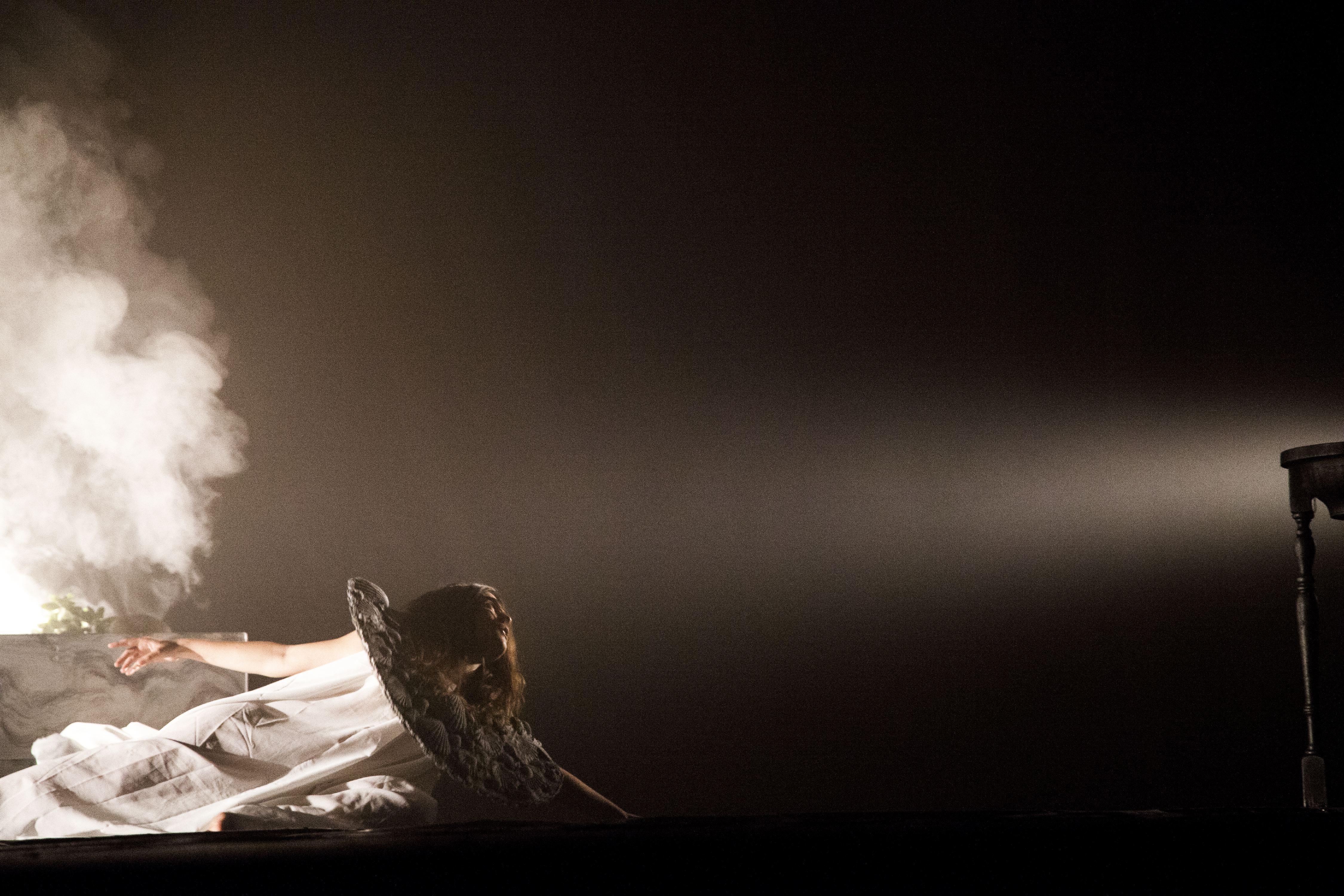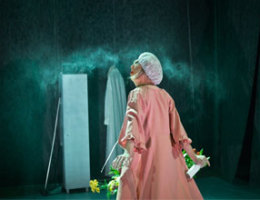
AZZURRA DE GREGORIO
VISUAL ARTIST AND THEATRE DIRECTOR
EX-STASIS
THEATRE
- YEAR :
2015
- CONCEPT:
Azzurra De Gregorio
- PHOTO:
Massimo Di Nonno
Scritto e diretto da/Written and directed by Azzurra De Gregorio
Produzione/Production Frentania Teatri, Vanitas Vanitatum
In coproduzione con/In coproduction with Fondazione Campania dei Festival
Sound design Rosa Della Sala
Scene/Set design Michelangelo Tomaro
Costumi/Costume design Marina Miozza
Con/With Loredana Canditone, Giulio Maroncelli, Eva Sabelli, Giandomenico Sale, Carmine Scotto Di Santolo
Ex-stasis mette in scena la bellezza e la potenza della trasfigurazione che si verifica quando un corpo è coinvolto in un’esperienza estatica, e ne indaga le possibili, molteplici manifestazioni.
L’osservatore esterno, una volta messo di fonte a tali estasi, potrà sì ricercarne il senso, ma non potrà mai addentrarsi nel nucleo profondo che ha condotto il‘personaggio’ ad una tale alterazione dello stato di coscienza, poiché quella estatica rimane sempre un’esperienza fortemente soggettiva.
Ex-stasis è un invito a ricercare divinità e beatitudine in ciò che ci appartiene profondamente e intimamente, è un inno che celebra la riappropriazione di propri spazi ‘mistici’ in cui fare esperienza diretta con il divino e con forze, potenze o spiriti del mondo soprasensibile. Poiché è soprattutto nella possibilità di scegliere come vivere il proprio rapporto con ciò che considera divino che l’individuo afferma la sua autonomia.
I momenti di particolare elevazione estatica, sebbene siano dotati di un carattere di straordinarietà e sporadicità, rivestono però un ruolo centrale nella vita di un individuo poiché, grazie ad essi, egli abbandona qualsiasi tipo di forma intellegibile, trascende i propri limiti e sperimenta uno stato di beatitudine estrema. Tutto ciò, pur rappresentando una minaccia per l’integrità dell’io, costituisce uno spazio di libertà e di piacere in cui l’ordinarietà, la ripetitività ed il conformismo che caratterizzano la vita ‘normale’ di un individuo vengono momentaneamente messe da parte per lasciare spazio al sublime, all’ ineffabile: “Normalmente, nulla è per noi più sicuro del senso di noi stessi, del nostro proprio io… verso l’esterno, almeno, l’io sembra mantenere linee di demarcazione chiare e nette. Solo in uno stato, in uno stato in verità eccezionale, ma non tale da poter essere stigmatizzato come patologico, le cose vanno diversamente. Al culmine dell’innamoramento, il confine tra io e oggetto minaccia di dissolversi” (S. Freud, Il Disagio della Civiltà).
EX-STASIS
Ex-stasis represents the beauty and the power of the transfiguration that occurs when a body is involved in an ecstatic experience and investigates its possible, multiple manifestations.
The external observer, when set before such ecstasys, will be able to look for its sense, but will never discover the deep nucleus that has lead the ‘character’ to such an alteration of the state of consciousness, because the ecstatic one will always remain a subjective experience.
Ex-stasis is an invite to search for divinity and beatitude in what deeply and intimately belongs to us, is a hymn that celebrates the recovery of personal ‘mystic’ spaces where is possible to experience the divine, the strengths, the powers and the spirits that belong to the supersensible. Because the individual affirms his/her autonomy especially in the possibility to choose the way to live his/her own relation with what he/she considers divine.
Although the moments of particular ecstatic elevation are rare and extraordinary, they have a leading role in life because, through them, the individual abandones every kind of intelligible shape, goes beyond his/her limits and experiments a state of extreme beatitude. Even if this represents a menace for the ego integrity, at the same time it constitutes a space of freedom and pleasure where mediocrity, repetitiveness and conformism -typical in a ‘normal’ life- are momentarily forgotten to give space to the sublime, the ineffable: “Normally, nothing is safer for us than the sense of ourselves, of our own ego… towards the external, at least, ego seems to maintain clear and sharp dividing lines. Only in a state of exceptional truth, a non pathological one, things go in a different way. On the topic moments of the falling in love process the boundary between the ego and the object menaces to dissolve itself” (S.Freud The civilization and its discontents).
Azzurra De Gregorio ©, All Rights Reserved - Website by NoMaker, Inc.























